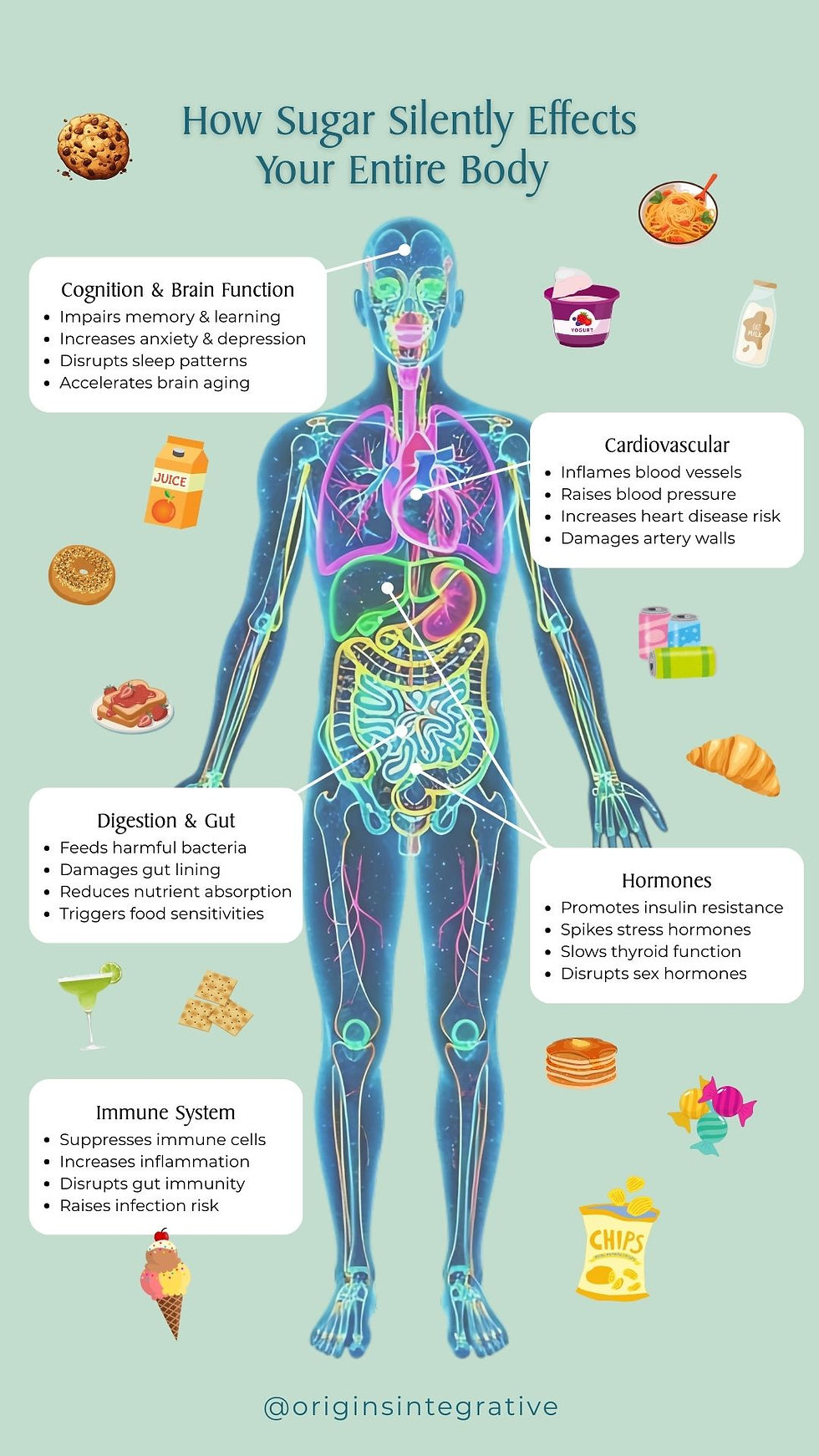SIBO, Small Intestinal Bacterial Overgrowth
- Elisse Evans, ND

- Aug 19, 2019
- 4 min read
Updated: Mar 8, 2022

At Origins, we are treat a large percentage of patients who have a condition called SIBO (Small Intestine Bacterial Overgrowth). SIBO occurs when bacteria that should reside in the large intestine have worked their way into the small intestine, causing an overgrowth of bacteria where it doesn’t belong.
Normal Operations
Our GI tract is made up of a few different parts: the mouth, esophagus, stomach, small intestine, large intestine, rectum, and anus. There are some side players, too, like the gall bladder, pancreas, and liver. Together, all of these organs work to digest food and turn it into energy. The small intestine’s function is to break down food and absorb nutrients so that it can be taken up by the bloodstream (Zimmerman).
What Causes SIBO?
The cause of dysfunction is complex and dependent on the person, therefore we can’t point the finger at one thing in particular. There are, however, several risk factors that can increase your chances of having SIBO:
Deficiency of migrating motor complex (MMC)
Anatomical /structural blocks
Antibiotics or frequent antibiotic use
Irritable Bowel Syndrome (IBS)
Crohn’s Disease
Celiac Disease
Diabetes mellitus I and II
Backsplash of Bacteria
In the digestive tract, a very important movement must occur in order for food to make its way from top to bottom. For food to be digested, our intestines rely on a peristaltic wave called the migrating motor complex (MMC) to clean out the intestines by pushing food through the entire digestive tract. Without this movement, undigested food either lays to waste in our gut or moves back up the tract, creating the perfect environment for bacterial overgrowth. A person who has a deficient MMC is likely to develop SIBO.
Symptoms
There are many symptoms associated with SIBO, most of which are closely related to IBS. The most common symptoms are:
- Gas
- Bloating
- Diarrhea and/or constipation
Other symptoms include:
- Fatigue
- Malabsorption of iron and/or b12
- Undigested food in the stool
- Heavy sensation in the abdomen
- Heartburn
- Nausea
- Acne
- Hormonal irregularities
- Restless leg syndrome
- Bad breath
- Weight gain/weight loss
Diagnosis
In order to figure out what is going on in the small intestine, a breath test is utilized to diagnose the problem. While this test is non-invasive and can be done at home, it does require some time and preparation to be completed! A kit is given to the patient with all the necessary information, equipment, and instructions in order to complete the test. The general procedure is as follows:
After prepping the gut for 24 hours, the test taker consumes a solution containing lactulose to feed the bacteria, which produce hydrogen and methane gas. Over the course of 3 hours, the test taker must simply breathe into tubes to collect the gas generated in their gut. A diagnostic company then analyzes these tubes for the presence of hydrogen and methane. Abnormally high levels of these gasses are indicators of SIBO.
Treatment
There are a few different parts to treatment of SIBO:
Part 1: Diet
In order to stop the bacteria from growing more, a specific diet must be followed in order to starve them of nutrients. This diet is called low FODMAP or foods that are low Fermentable Oligo-, Di-, Mono-saccharides And Polyols. Essentially, these are fermentable sugars! These types of food include: potatoes, rice/grains, corn, sugars, dairy products, legumes, soy, and alcohol. Cutting out these foods is crucial to prevent the bacteria from growing!
Part 2: Antimicrobials
While the diet plays a huge role in starving the bacteria, there also needs to be a killing agent involved to wipe the gut clean of these harmful bacteria. To do this, antimicrobials are utilized. According to a study conducted at Johns Hopkins, these strong herbs have shown to be just as effective as antibiotics when treating SIBO (Siebecker).
Part 3: Improving the Migrating Motor Complex
Lastly, we want to make sure we improve the MMC to make sure food is taking its proper course through the digestive tract. This is partially done by following the diet and antimicrobial protocol. In addition, taking a daily motility agent helps ensure the movement from the small to the large intestine, and preventing the building up of stagnant food or the backsplash of bacteria.
Think you might have SIBO? Call us today and book an appointment!
This blog is not intended to provide a health diagnosis, treat a medical condition, or provide medical advice. All content provided on this blog is for informational purposes. All posts and information provided within this blog is for informational and educational purposes only, and is not to be construed as medical advice or instruction. No action should be taken solely on the contents of this blog. Please consult your doctor or a qualified health professional on any matters regarding your health and well-being or on any opinions expressed within this blog.
References
Siebecker, A. SIBO-small intestine bacterial overgrowth. Weebly. https://www.siboinfo.com/
Zimmermann, K.A. (11 Mar, 2016). Digestive system: facts, function, & diseases. Live Science. https://www.livescience.com/22367-digestive-system.html




Comments